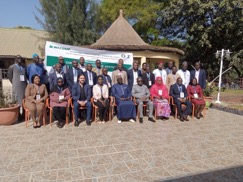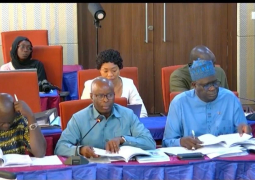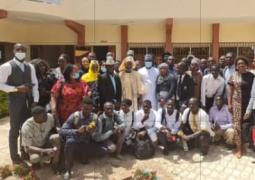
Speaking at a four-day TMC/ECOSHAM meeting on the validation of the draft ECOWAS standards relating to three regional value chains (mango, cassava and information and communication technologies), Hassan Gaye, DPS Ministry of Trade said: “It is therefore necessary for ECOWAS Commission and its member states to make available to our enterprises and conformity assessment bodies, national and regional standards in order to promote technology transfer, improve the production systems and the competitiveness of our enterprises.”
The meeting of the Technical Management Committee TMC/ECOSHAM, held at Senegambia and attended by participants from ECOWAS member states, was organised by the United Nation Industrial Development Organisation (UNIDO) and funded by the European Union.
The development of global value chains, DPS Gaye said, has become a dominant component to promote trade and investment. “The benefits of developing value chains are significant and can be measured in terms of productivity improvements, job creation and poverty reduction.”
“This regional dynamic initiated by ECOWAS Commission must be supported with innovative policies to strengthen the activities of our local production units in order to transform them into medium-sized enterprises as means to bridge the gap between them and multinational companies established in the region.”
“In addition, our raw materials often have difficulty accessing the international market due to the lack of internationally recognised conformity assessment bodies which are able to support enterprises to demonstrate the compliance of their products with the requirements of such markets.”
Aisha Sillah, programme manager at the European Union, said: “The EU has been providing various forms of support to the ECOWAS Commission to enhance their quality infrastructure and competitiveness programmes. The assistance includes financial support for creating and executing programmes aimed at improving quality infrastructure and competitiveness, including developing national quality policies, establishing quality infrastructure institutions, and designing technical regulations and standards.”
“We believe that standard harmonisation is crucial to improve the competitiveness and sustainability of mango, cassava and information and communication technologies’ regional value chains. We are confident that the validation of the draft ECOSTAND standards will contribute to the achievement of these objectives, enhance the region’s competitiveness and facilitate the integration of the ECOWAS region into the global economy.”
Christian Lasser, the project administrator at the United Nation Industrial Development Organisation (UNIDO), said: “There is no longer any doubt that industrialisation and the promotion of the business environment are an essential factor in economic growth and sustainable development. They enable the creation of productive jobs, income generation and the facilitation of social integration.”
The AU’s continental strategy, he added, in line with the ECOWAS strategy, also encourages industrialisation focused on the development of commodity value chains as a driving force for the realisation of structural, social and economic transformations on the continent.
“Inclusive and sustainable industrialisation is an important part of the way forward for the ECOWAS region, as a key element in advancing economic diversification and structural transformation to achieve ECOWAS 2050 VISION.”
Lassane Kabore from the ECOWAS Commission underscored the significance of the convergence, while urging the participants to live up to expectations.
“The development of a value chain is key and significant to poverty reduction and creating employment.”




